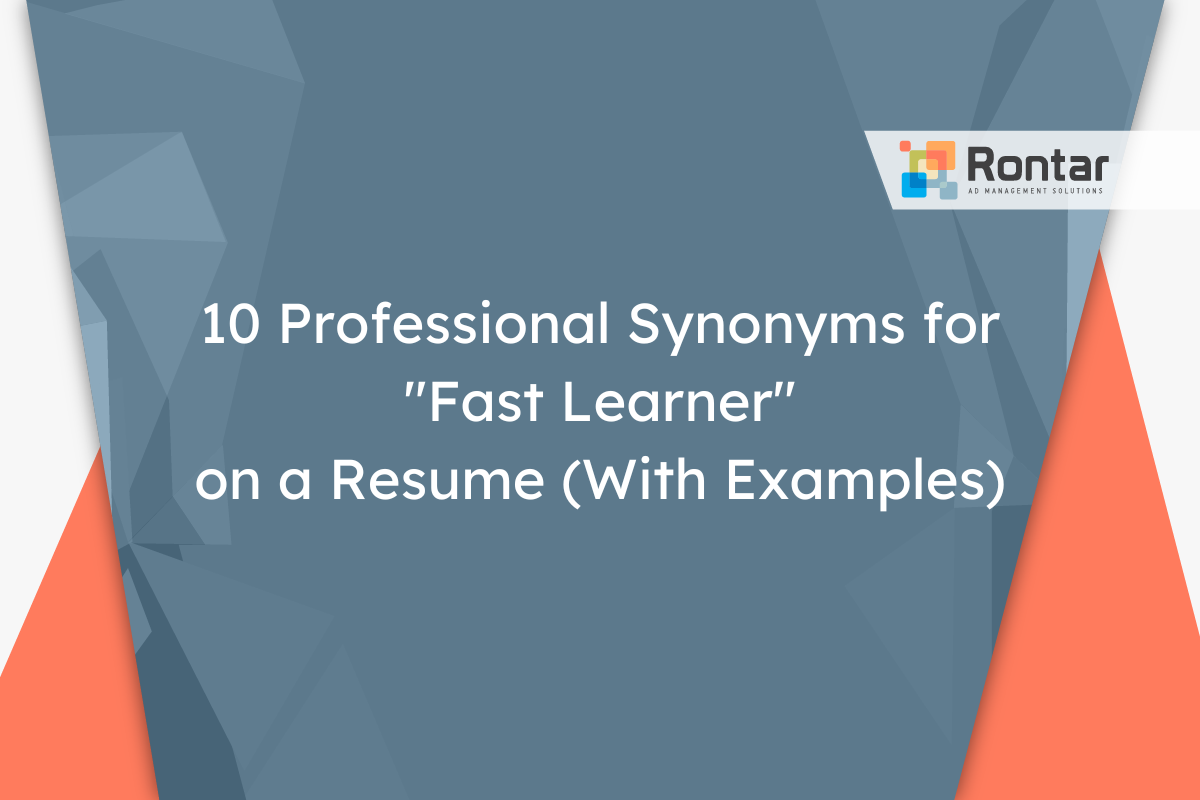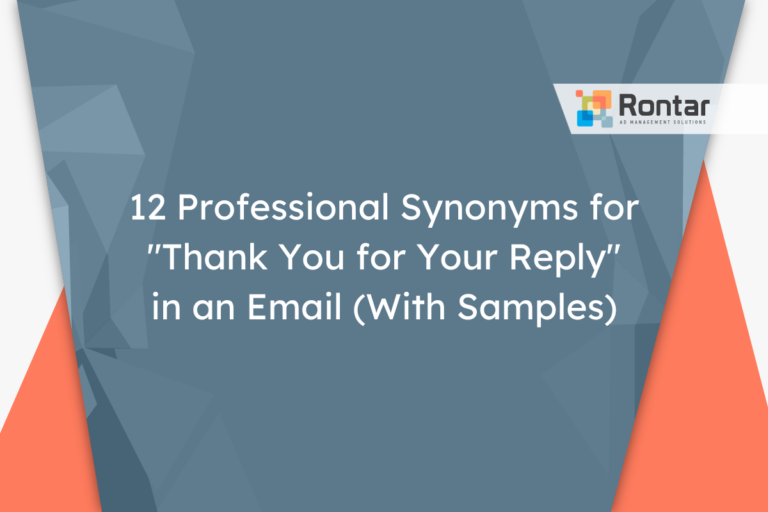10 Professional Synonyms for “Fast Learner” on a Resume (With Examples)

In today’s job market, standing out is key. Using the phrase “fast learner” on your resume is common, but there are better ways to say it.
This article provides 10 professional alternatives to “fast learner” and explains when to use each one. Get ready to make your resume shine by picking the right words to highlight your learning skills.
Is It Professional to Say “Fast Learner”?
Yes, it is professional to say “fast learner” on your resume. This phrase can be particularly useful in situations where you are applying for jobs that require you to pick up new skills or adapt to new environments quickly. It shows potential employers that you are capable of learning new things without much supervision.
Example:
In my previous role, I was recognized as a fast learner for independently mastering our new project management software in under a week, significantly ahead of the company-wide training schedule.
Here are the pros and cons of using the phrase “fast learner.”
Pros:
- Highlights your ability to quickly absorb new information.
- Shows initiative and willingness to grow in your role.
- Makes you attractive to employers looking for adaptable employees.
Cons:
- It’s a common phrase that may not set you apart from other candidates.
- Without specific examples, it can seem vague or unsubstantiated.
- Some employers may prefer more specific skills or competencies.
While “fast learner” is certainly a positive trait to mention, you might want to consider using synonyms or alternatives to stand out more. Using different words can help you avoid cliches and make your resume more memorable. Plus, different phrases might better match the specific skills or traits an employer is looking for. Finding the right synonym or alternative can help tailor your resume to each job you apply for, making it more effective overall.
10 Other Ways to Say “Fast Learner” on a Resume
Here are 10 professional alternatives to “fast learner” that can make your resume stand out.
- Quick Study
- Rapid Learner
- Adept at Picking Up New Skills
- Quick to Master New Concepts
- Efficient in Acquiring New Knowledge
- Swift at Learning New Processes
- Highly Adaptable
- Eager to Learn
- Skilled at New Skill Acquisition
- Proficient in Learning Quickly
1. Quick Study
This alternative is equally professional and conveys the ability to learn quickly. It’s a bit more unique than “fast learner,” making your resume potentially more memorable to hiring managers. The term “quick study” implies not only speed but efficiency in learning, suggesting that you grasp concepts with a brief study period.
When the job description emphasizes the importance of being able to adapt and learn new things rapidly, this alternative is especially suitable. It blends formality with the ability to showcase your learning capacity without sounding too casual.
Here are a couple of examples:
Recognized by my supervisor as a quick study in my previous job, mastering the company's database software ahead of the predicted schedule.
My ability to be a quick study was evident when I learned and led a new project management tool within my team.
2. Rapid Learner
“Rapid Learner” is another professional synonym that directly emphasizes speed in the learning process. It’s straightforward and directly to the point, conveying your ability to quickly absorb information and adapt to new situations. This term is particularly useful in industries where technology or methods evolve rapidly.
This alternative shines in fields like technology or marketing, where staying updated with the latest trends and tools is crucial. Its formality makes it a solid choice for nearly any professional setting.
Sample uses include:
As a rapid learner, I swiftly adjusted to the new software updates, ensuring no downtime in my department.
My role as team leader was enhanced by my reputation as a rapid learner, always keeping ahead of industry trends.
3. Adept at Picking Up New Skills
This phrase offers a more detailed alternative, focusing on the skill acquisition aspect. It suggests not just speed but a certain skillfulness in learning. “Adept” implies a level of proficiency and competence, which adds depth to your ability as a fast learner.
We recommend this phrase for resumes aimed at sectors that value continuous personal development and skill enhancement, such as IT or education. It strikes a balance between being formal and showing a proactive approach to learning.
Here are two examples:
Demonstrated adeptness at picking up new skills by transitioning to an entirely different role within the company within months.
My last project showed I am adept at picking up new skills, as I led the integration of a new system into our workflow.
4. Quick to Master New Concepts
This synonym emphasizes not only the speed of learning but also the depth, suggesting that you do not just learn things quickly but also gain a strong understanding. It’s particularly impressive because it conveys the idea of mastery, not just acquaintance, with new concepts.
This alternative is better suited when applying for roles that require deep understanding and expertise in certain areas. It’s a formal way to demonstrate your capacity to not just learn but excel in new challenges.
For instance:
I am quick to master new concepts, as shown when I pioneered our team's adoption of advanced data analytics techniques.
My quick mastery of new concepts enabled me to contribute innovative solutions to our project strategy.
5. Efficient in Acquiring New Knowledge
This option highlights efficiency alongside the ability to learn, positioning you as someone who does not waste time in the learning process. It suggests a methodical approach to understanding new information, making it ideal for roles that require both speed and precision.
This phrase is especially fitting for analytical or technical positions where efficiency in learning can significantly boost performance and productivity. Its professional tone assures employers of your serious commitment to continual growth.
Consider these samples:
My efficiency in acquiring new knowledge helped streamline the onboarding process for new technologies at our firm.
Acknowledged for my efficiency in acquiring new knowledge, facilitating the early completion of several key projects.
6. Swift at Learning New Processes
This alternative underscores your capability to adapt to new methods or workflows, making it a standout choice for operational or procedural roles. It showcases an ability to integrate into different environments or systems promptly.
For positions that require quickly adapting to changes in procedures or systems, this phrase is particularly impactful. Its professional nature keeps the focus on your adaptability and readiness to contribute efficiently from the start.
Examples include:
I am swift at learning new processes, enabling me to lead the transition to the new inventory management system.
Being swift at learning new processes allowed me to excel in diverse roles across the company.
7. Highly Adaptable
“Highly Adaptable” suggests a broader capacity to adjust not only to new knowledge but also to varying conditions and environments. It implies resilience and versatility, qualities highly regarded in dynamic industries.
When the job requires you to operate effectively under different conditions, manage varied tasks, or interact with diverse technologies, this term is ideal. It speaks of a professional readiness to face and thrive in changing scenarios.
Usage examples:
Known for being highly adaptable, I successfully navigated multiple department shifts, each time increasing department efficiency.
My highly adaptable nature was crucial in managing projects with shifting deadlines and objectives, ensuring we met all targets.
8. Eager to Learn
This softer alternative conveys your enthusiasm for acquiring new knowledge, making it less about the speed of learning and more about the attitude towards growth. It portrays a positive, open-minded approach to challenges.
This phrase works well in environments that value cultural fit and personal growth alongside technical skills. It’s somewhat less formal but reflects a genuine willingness to develop, which can be particularly appealing in creative or innovative fields.
For example:
As someone eager to learn, I have taken several online courses to refine my skills and stay ahead of industry trends.
My eagerness to learn was demonstrated by volunteering for new projects outside my usual responsibilities, broadening my professional experience.
9. Skilled at New Skill Acquisition
This phrase places emphasis on the ability to acquire not just knowledge, but skills. It’s a subtle but significant distinction that suggests practical competence in addition to theoretical understanding. “Skilled at new skill acquisition” speaks to an ability to translate learning into action.
We recommend this for roles that require hands-on abilities in addition to theoretical knowledge. It maintains a formal tone while highlighting a pragmatic approach to learning and improving one’s skill set.
Sample examples:
My background as skilled at new skill acquisition was evident when I quickly became proficient in the latest industry-standard software, contributing to enhanced team productivity.
Being skilled at new skill acquisition, I seamlessly integrated new technical methods into our workflow, advancing project outcomes.
10. Proficient in Learning Quickly
This alternative emphasizes proficiency, suggesting not just speed but expertise in learning. It’s a formal term that conveys competence and a high level of ability. This phrase is excellent for indicating that you not only learn fast but do so with a depth of understanding.
This is particularly suitable for roles that require complex knowledge acquisition or rapid mastery of skills. It assures employers of your capacity to be up and running with new challenges without prolonged training.
Consider these examples:
Proficient in learning quickly, I handled a wide array of tasks across multiple projects, excelling in each.
My proficiency in learning quickly enabled me to adapt to and lead new initiatives within the company, demonstrating my versatility.
Final Thoughts
Choosing the right words to describe your learning skills can make a huge difference on your resume. Instead of going with the usual term “fast learner,” we’ve explored 10 professional alternatives that can help you stand out. Each has its own best use case, depending on the job’s needs and your personal strengths.
Remember, your choice of words can paint a vivid picture of your abilities and make hiring managers notice you. Use this guide to tweak your resume and show that you’re not just any candidate—you’re the right one for the job.






